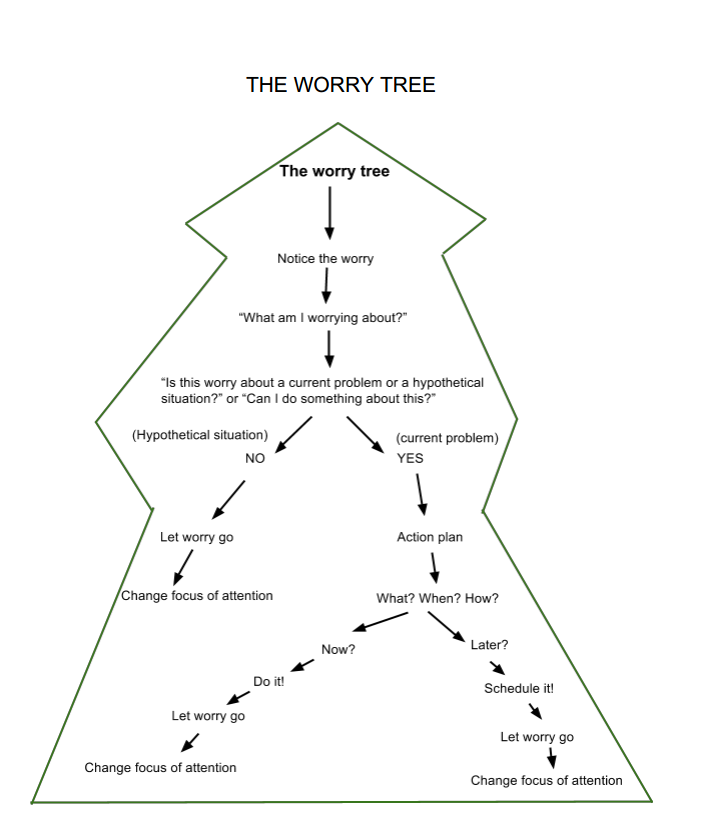5 Great Ways to Stop Worrying and Start Living
Tip 1: Keep a “Worry Journal”
Getting our worries out of our heads is an essential first step for anyone who wants to learn how to manage their worry. We can do this by simply putting our worries down on paper. This basic action in itself can de-power the worry.
We are often surprised by how ridiculous some of our worries appear to us when we see them written down. In this way, we are much less likely to believe the feared outcome or take the thoughts so seriously.
Writing our worries into a diary can also help us see the things, people, places and times that trigger us to start worrying. This can be really useful and often we can identify patterns to our worry.
Seeing our worries in written form, helps us decide if our worries are legitimate or if our minds and imaginations are simply playing tricks on us. Some worries are current real worries and therefore need us to take action. Whereas some are purely hypothetical and have no basis in reality. It’s important to be able to make a distinction between the two types of worry.
Tip 2: Trees can help us Stop Worrying
We can use a “Worry Tree”, just like the one above, to help separate what we are worrying about into a REAL or HYPOTHETICAL worry. If a worry is a real current problem we can problem solve* and create an action plan. Once we have worked out when and how we will put our action plan into place then we can “let go” of the worry and place our attention on another activity.
If through using the tree we identify that our worry is HYPOTHETICAL often this is enough to enable us to let go of our worry and with our focus on to something else.
*See our handout below on how to “Problem Solve Effectively”.

Tip 3: Worry is no match for Mindfulness:
Practising Mindfulness regularly enables us to develop the muscle to notice “Worry Spirals” quicker and “Let go of our worry” quickly with increasing less effort.
To start just sit in a quiet room on your own and focus your attention on your breath and your abdomen. Try as best as you can to keep your concentration on your breath and the rising and falling of the abdomen that naturally occurs. Whenever you notice that your Mind has wandered from your breath, don’t give yourself a hard time. Simply notice that’s what’s happened and return your attention to your breath. Keep repeating this for 10 -20 minutes.
Try to practice every day if you can. The more you practice the more you will master your worry.
Tip 4: Allergic to Uncertainty?
Some experts in the field of Psychology believe that we worry as a way to gain certainty in life. And that people who worry more than others are trying to get an excessive amount of certainty. They are doing this because they find it very difficult to tolerate and accept how random and uncertain life really is. Often people compare uncertainty to pollen with hay fever sufferers. Hay fever sufferers just need a tiny bit of pollen to set them off and so worriers need a tiny bit of uncertainty.
Often worriers will not only engage in a cycle of mental worry they will also do lots of things to try to ensure their feared event doesn’t occur ie
So if you fall into this camp try to deliberately do things that will strengthen your natural ability to tolerate uncertainty by doing activities where you would normally try to make certain it was right or nothing could go wrong ie Writing and sending an email without checking it or serving food that you haven’t tasted yourself to see if the seasoning is correct or picking and going to see a movie that you know nothing about.
These are just a few ideas but if you prefer you can also think of your own activities to build a stronger ability to be with life’s uncertainties.
Tip 5: The Worry Hour:
I don’t know about you but when I used to be a real worrier, I’d often find myself worrying about things at the most inconvenient times and often when I needed to concentrate on an important task or activity.
One very simple way to handle our worrisome minds is to postpone our worry to a time that suits us. You just need to pick a regular hour during the day when things are less hectic. Then whenever you are going about your day and you notice that you are worrying about something, just say to yourself “I’ll worry about that in my worry hour”. When it comes to your Worry hour time try to use it to think/worry about all the things your Mind wanted to worry about before. If you can’t then that’s an added bonus!
We hope these 5 Tips will help you to Stop Worrying and start enjoying your life more.
Now check out the FREE Guided Audio to help you Manage your Worry.
Copyright CBT Clinic London 2019. All rights reserved.
-
Would you like to learn further ways to banish your worry forever?
-
Are you thinking about receiving treatment for Worry?
-
Does your Worry keep you awake at night?
-
Is your Worry Excessive?

